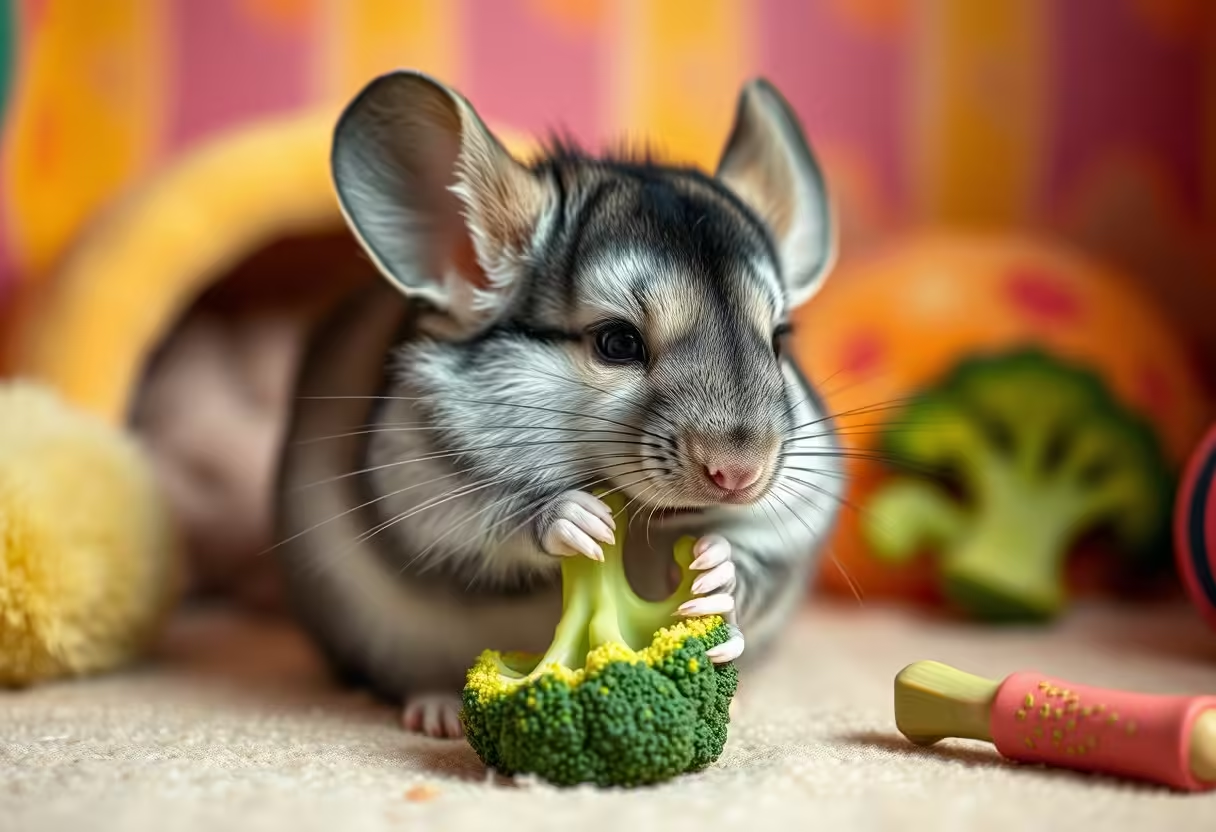Yes, but Only in Very Small Amounts as an Occasional Treat
Chinchillas have highly sensitive digestive systems, and their diet needs to be carefully managed to ensure optimal health. While broccoli contains beneficial nutrients like vitamins and fiber, it also has high levels of calcium and oxalates, which can cause health issues if consumed in excess. This guide will explain the risks and benefits of feeding broccoli to your chinchilla, along with safer alternatives and dietary tips.
Key Takeaways
- Broccoli is not ideal for chinchillas but can be given in very small portions occasionally.
- High calcium and oxalates in broccoli can lead to kidney stones and other health complications.
- Stick to a diet of hay, pellets, and safe vegetables like kale or bell peppers to keep your chinchilla healthy.
Why Is Broccoli Controversial for Chinchillas?
Broccoli can offer certain health benefits but also poses risks due to its nutritional composition.
Nutritional Profile of Broccoli
| Nutrient | Amount (per 100g) | Impact on Chinchillas |
|---|---|---|
| Calcium | 47mg | Excess calcium can cause kidney stones. |
| Oxalates | Moderate | Can bind to minerals and disrupt digestion. |
| Fiber | 2.6g | Supports digestion in moderation. |
| Vitamin C | 89mg | Boosts immune function. |

Risks of Feeding Broccoli to Chinchillas
- Kidney Stones
- The high calcium content in broccoli can lead to kidney stones when consumed regularly.
- Digestive Upset
- Too much fiber or oxalates can disrupt a chinchilla’s gut, causing bloating, diarrhea, or discomfort.
- Overfeeding Concerns
- Even a small amount of broccoli, if given too frequently, can lead to long-term health issues.
Signs of Adverse Reactions
- Diarrhea or soft stools.
- Bloating or reduced activity.
- Decreased appetite.
If these symptoms occur, stop feeding broccoli immediately and consult a veterinarian.
How to Feed Broccoli Safely
If you decide to offer broccoli to your chinchilla, follow these precautions:
- Portion Control
- Serve no more than 1-inch floret once a week.
- Preparation
- Wash thoroughly to remove pesticides.
- Serve raw, as cooked broccoli can lose nutrients and may contain added oils or seasonings.
- Monitor Your Pet
- Introduce broccoli gradually and watch for signs of digestive upset.
Safe Vegetables for Chinchillas
Incorporating vegetables into your chinchilla’s diet can provide variety and essential nutrients. Below is a list of safe and unsafe options.
| Safe Vegetables | Reason |
|---|---|
| Kale | High in vitamins, low in sugar. |
| Bell peppers | Rich in nutrients, easy to digest. |
| Carrots | Sweet but low in calcium; use sparingly. |
| Unsafe Vegetables | Reason |
|---|---|
| Potatoes, sweet potatoes | High starch content, difficult to digest. |
| Onions, garlic | Toxic to chinchillas, can cause severe health issues. |
| Corn | High sugar and starch, can disrupt digestion. |
Primary Diet Recommendations
Staples
- Timothy Hay: Unlimited access to high-quality hay is essential for digestion and dental health.
- Chinchilla Pellets: Feed 1–2 tablespoons of chinchilla-specific pellets daily.
Occasional Treats
- Dried Herbs: Chamomile, mint, or dandelion leaves.
- Dried Fruits: Small amounts of rosehips or goji berries.
FAQs
Q: Can chinchillas eat broccoli?
A: Yes, but only in very small amounts as an occasional treat. High calcium and oxalates in broccoli make it unsuitable for regular feeding.
Q: How much broccoli can I give my chinchilla?
A: Offer no more than a 1-inch floret once a week. Always monitor your pet for any signs of digestive upset.
Q: What are better alternatives to broccoli?
A: Safer options include kale, bell peppers, and carrots. These provide nutrients without the risks associated with high calcium or oxalates.
Conclusion
While broccoli can be fed to chinchillas in very small quantities, it is not an ideal treat due to its high calcium and oxalate content. A balanced diet of hay, pellets, and safe vegetables is essential for your chinchilla’s health. Always introduce new foods gradually, monitor for adverse reactions, and consult a veterinarian if you’re unsure.
By following these guidelines, you can ensure your chinchilla stays happy, healthy, and well-nourished.
